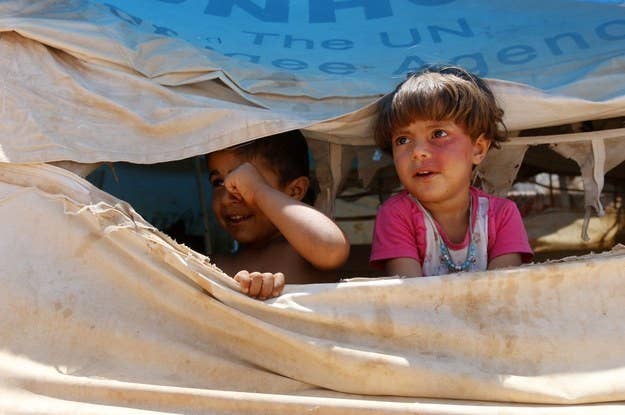
GAZIANTEP, Turkey — Medical and aid workers are scrambling to work out what caused a series of infant deaths in the Syrian province of Idlib amid reports that children have died died as a result of an opposition-run vaccination campaign.
An official from the opposition's government-in-exile based in Turkey said an investigation into what went wrong was underway. Assad al-Achi, the executive director of the Assistance Coordination Unit (ACU), which oversees deliveries of humanitarian aid into Syria, said that as of Tuesday night, at least eight infants were confirmed dead, and that rumors from Idlib put the number as high as 40.
Achi said most of the deaths resulted from shock. Yet there were no concrete answers yet on what had gone wrong. "What happened is still being investigated," Achi said.
The measles campaign is part of an extensive vaccination effort intended to combat a grave and growing problem of unvaccinated children in war-torn Syria. The vaccinations in question were given orally, Achi said, and were part of a batch delivered to Syria by the World Health Organization via the Turkish Red Crescent. Once in Syria they were received by employees of the opposition government's health ministry, which runs the vaccination program. The vaccinations were sent to a town in the Idlib suburbs called Jarjanaz and distributed to surrounding areas, according to another source in the opposition government. The vaccination program is sponsored by the United Nations.
While the ACU wasn't involved in administering the vaccinations, Achi said, it was participating in the internal investigation.
Echoing statements from other opposition officials, Achi said that there had been no issues with the transportation of the vaccinations or with their storage, at least until Tuesday, because vaccinations from the same shipment had been used in other areas with no ill effects. This claim couldn't be independently verified, and Achi stressed repeatedly that the incident was still under investigation and new details could emerge.
He said the opposition government was considering three possible scenarios that may have led to the tragedy.
First, the vaccinations could have gone bad in storage in Idlib, making them unsafe. But Achi said that the symptoms of the affected infants did not appear to match this scenario.
The opposition was also investigating an "act of sabotage" against the vaccinations, Achi aid. But he said that possibility was unlikely, and that the facility was well guarded and that access to it was monitored. And finally, he said, parts of the vaccine shipment may have been faulty from the start.
Additional causes for the deaths could emerge as the investigation continued, he said.
The tragedy spotlights the difficulty of delivering medical care in opposition-held parts of Syria, many of which face continued aerial bombardment from the Syrian regime and are at the mercy of armed rebel groups on the ground. "We're going through a war zone, and sometimes you face unexpected challenges," Achi said. "We are operating under very difficult circumstances, and we are operating under a lot of pressure. A huge amount of children need to be vaccinated, and our medical team is small in number."
Achi added that locals were now wary of the vaccination program, an outcome that was sure to complicate future efforts. "There's a lot of anger, and that's understandable," he said. "People want someone to be held accountable."
The scale of the need for the vaccination problem in Syria remains overwhelming — and Achi vowed that while the vaccination campaign had been halted pending investigation, it would ultimately continue. "There are 1.5 million children who haven't had access to vaccinations in the last two years, and that's just in the provinces of Idlib and Aleppo," he said. "The situation is really dangerous for all Syrians, and that's why we're not going to stop or scale back our vaccination campaign."
